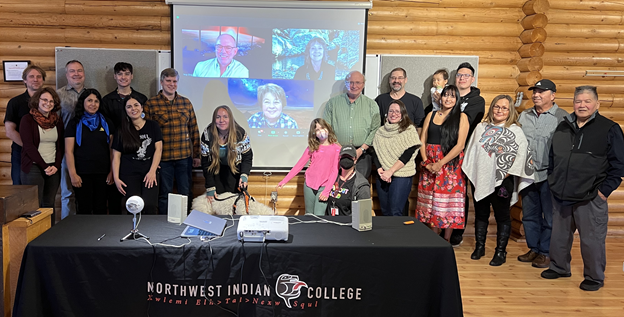ASTRO ACCEL brings together researchers and practitioners in the domains of astronomy education, engagement, communication and culture to connect stakeholders and advance these areas of research, proudly unveils its inaugural cohort of eight early career researchers.
Recent News
NSF Funds New Opportunity for Undergraduate Students
AUI and UNC-Chapel Hill are currently seeking undergraduate students to contribute to cutting-edge research in astronomy education. This paid opportunity, open to education and STEM majors, explores the impacts of new curriculum centered on the use of robotic telescopes.
Stellar Explosions and Cosmic Chemistry
Astronomers have discovered the secrets of a starburst galaxy producing new stars at a rate much faster than our Milk Way. This research revealed many different molecules, more than ever seen before in a galaxy like this.
Northwest Indian College Hosts Inaugural Cosmovisions of the Pacific Meeting

Bellingham, Washington – Over 14,000 years ago, Indigenous groups in the Pacific traveled by boat, guided by starlight, and likely settled the West Coast of the Americas. Today, Indigenous and non-indigenous people gathered at Northwest Indian College (NWIC) to explore similarities and differences between Indigenous ways of knowing and non-indigenous science practices in astronomyelated disciplines. In this first gathering of the Cosmovisions of the Pacific, participants enjoyed cultural presentations, engaged in hypothetical scenarios, and discussed differences and similarities in approaches, areas of potential collaborations, and ideas for future projects.
Cosmovisions, or worldview, is an appropriate name for a partnership that seeks to cultivate culturally responsive collaboration for the awareness and advancement of Indigenous ways of knowing, and astronomy-related education and research in the 21st century. This partnership is composed of the Indigenous Education Institute (IEI), the Imiloa Astronomy Center of Hawaii’, AUI, and made possible by funding through the Heising-Simons Foundation.
“Cosmovisions of the Pacific has helped me to understand how other Indigenous and non-indigenous see, connect, and interpreted what is around us,” said AUI’s Senior STEM Education Specialist, Yasmin Catricheo. “As an Indigenous woman that works in science and education, being able to understand how others connect with the universe and with each other is crucial when it comes to finding ways of cooperation to build a strong and inclusive future for all ways of knowing.”
Together, the group will develop a whitepaper based on the findings of today’s event, identifying key areas of future collaborative research between Indigenous and non-indigenous investigators and practitioners, as well as a protocol for implementation of collaborative research based on principles of “Collaboration with Integrity”, developed through the work of IEI. The whitepaper will lay the foundation for phase 2 of the Cosmovisions of the Pacific gathering of 150 Indigenous and non-indigenous persons.
More Information
AUI is an independent, non-profit corporation founded in 1946 that specializes in designing, building, and managing cutting-edge research facilities and the development and implementation of innovative approaches to education, outreach, and workforce development. Currently, AUI manages two U.S.-funded research and development centers: The National Radio Astronomy Observatory (NRAO) and the Green Bank Observatory (GBO). NRAO is the North American partner in the management of the Atacama Large Millimeter/submillimeter Array (ALMA) in Chile. In addition, NRAO includes the Very Large Array (VLA), and the Very Long Baseline Array (VLBA), and GBO is home to the 100-meter Green Bank Telescope.
Media Contact: Matt Schaub
[email protected]
Recent News
ASTRO ACCEL Announces Inaugural Cohort of Early Career Researchers
ASTRO ACCEL brings together researchers and practitioners in the domains of astronomy education, engagement, communication and culture to connect stakeholders and advance these areas of research, proudly unveils its inaugural cohort of eight early career researchers.
NSF Funds New Opportunity for Undergraduate Students
AUI and UNC-Chapel Hill are currently seeking undergraduate students to contribute to cutting-edge research in astronomy education. This paid opportunity, open to education and STEM majors, explores the impacts of new curriculum centered on the use of robotic telescopes.
Stellar Explosions and Cosmic Chemistry
Astronomers have discovered the secrets of a starburst galaxy producing new stars at a rate much faster than our Milk Way. This research revealed many different molecules, more than ever seen before in a galaxy like this.
